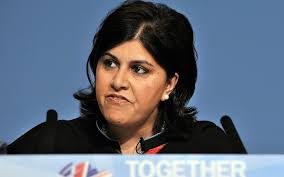This is a Cross Post from the Mail
Written by Andrew Pierce – The Original can be Viewed Here
As a display of cynicism and disloyalty, the timing of Baroness Warsi’s resignation from the Government could not have been more calculating.
On Monday night, she represented the Government at a moving ceremony at Westminster Abbey to commemorate the start of World War I.
She had been picked personally by David Cameron to extinguish a candle which symbolised the 1914 Foreign Secretary Lord Grey’s observation on the eve of war that: ‘The lamps are going out all over Europe.’
It later transpired — to Downing Street’s fury — that the Senior Foreign Office Minister had played this central role in the service having already decided to resign dramatically the following morning.
A veteran of PR photo-calls — as a daughter of Pakistani immigrants, she attended her first Cabinet meeting wearing a pink and gold shalwar kameez — Warsi knew the impact of her departure would be far greater coming only hours after she had been seen sitting alongside the Duchess of Cornwall at the Abbey.
While she genuinely believes the Prime Minister should be speaking out more strongly against Israel, one questions whether her departure also owes much to her resentment over her stalled ministerial career.
Fiercely ambitious, Warsi was incensed when she was overlooked for promotion in last month’s botched Government reshuffle, while a string of women saw advancement.
Yet promotion was never a possibility. David Cameron actually resisted pressure from senior colleagues to sack Warsi who, with an extraordinarily inflated view of her own abilities, had vain hopes of succeeding William Hague as Foreign Secretary.
The lurid language in Warsi’s resignation letter, coupled with its timing and the fact that Gaza and Israel have actually agreed to a ceasefire, seem to betray her true objective: to inflict maximum damage on Cameron who she doesn’t like or respect. She did not even do him the courtesy of warning him, instead releasing her resignation letter via Twitter.
The resulting political mess is entirely of Cameron’s own making. He promoted Warsi to the Cabinet after the general election to Tory Chairman — traditionally a job for a heavy hitter — not because of her brilliant oratorical skills or shrewd political insights but because of her ethnicity and sex. She is the first Muslim woman to serve in a British Cabinet.
Working class, educated at a comprehensive, and with a broad Yorkshire accent, Warsi ticked all the politically-correct boxes — she was the perfect antidote to Cameron’s middle-aged, grey, Eton-educated colleagues.
She was the manifestation of the idea that Conservatives were no longer the party of privilege.
While a woman of considerable willpower, Warsi — a solicitor who studied law at Leeds University — had neither the experience for the job nor any empathy with Tory members.
Compared to the likes of Norman Tebbit, who was Margaret Thatcher’s Tory chairman, Warsi was also a political lightweight — and, worse, she had never been elected as an MP.
She stood as a candidate in her native Dewsbury, Yorkshire, in 2005, a winnable seat. But while the Tory share of the national vote increased, it fell in Dewsbury and Labour won.
Cameron responded by putting her on his so-called A-list to propel women, ethnic minorities and gays into safe seats. She was not even selected so Cameron elevated her to the House of Lords in 2007 as Shadow Minister for Community Cohesion.
It was part of his attempt to reach out to the ethnic vote even though Indians, rather than Pakistanis, are more likely to vote Tory according to recent research. In Cabinet she swiftly became known as the ‘Blundering Baroness’.
She claimed electoral fraud within the Asian community cost the Tories three seats at the election — but refused to name the seats where the result had been fixed.
She was also forced to deny saying she did not want more Muslim MPs because ‘Muslims that go to Parliament don’t have any morals or principle’. Her comments in Urdu, made at a private dinner, were misinterpreted, she says.
Unlike previous Tory chairmen, she was rarely allowed near a TV or radio microphone because of fears she would commit gaffes. Meanwhile, Tory membership and donations slumped on her watch.
Having failed to win the confidence of the party’s grassroots, Warsi seemed destined to be sacked in the first reshuffle in autumn 2012.
But Cameron was desperate to cling on to his only Muslim Cabinet minister and to maintain his ratio of women on the frontbench.
A title of Senior Minister at the Foreign Office was created for her. Within weeks she was disowned by Downing Street after making a speech in which she claimed that Islamophobia had passed the ‘dinner table test’ — by which she meant that it had become socially acceptable among the chattering classes. She then linked Ukip supporters to the racist BNP and in March appeared on a TV political show brandishing a spoof newspaper front page poking fun at Number 10’s ‘Eton mess’.
Cameron was not amused.
Sayeeda Hussain Warsi, 43, grew up in a traditional Muslim family. One of five sisters, her Pakistani-born father, who came to Britain in 1971, was a mill worker who became a bus driver and driving instructor before setting up a firm manufacturing beds. When he retired, it had a £2 million turnover.
When she was 19, her parents arranged a marriage with a cousin in Pakistan. The couple had a daughter, now 15, and divorced in 2007.
Two years later she was accused of ‘stealing’ the husband of a vulnerable Pakistani woman in Dewsbury whose grasp of English was so poor she did not realise she was being divorced.
After Warsi’s marriage to Iftikhar Azam, members of the woman’s family claimed she signed a decree nisi document believing it to be a domestic gas bill. The allegations, which were strenuously denied, were embarrassing as Warsi was still at that stage being promoted as the multi-cultural face of the Tory Party.
To her credit, she spoke out against the grooming of white women by some Asian gangs, saying: ‘There is a small minority of Pakistani men who believe that white girls are fair game. You can only start solving a problem if you acknowledge it first.’
Meanwhile, Warsi, who describes herself as a ‘northern, working-class roots, urban, working mum’, was outspoken in her belief that foreign spouses should have to learn English before gaining admission to the UK. She also insisted, despite metropolitan mockery, that religious faith should have a place at the heart of government.
But in the summer of 2012 she was mired in controversy again when it emerged she had claimed parliamentary expenses for overnight accommodation at a house in which she stayed for free.
“Westminster was thick with rumour last night that Warsi might defect to Labour”
She was cleared of irregularities, criticised over a lack of transparency over her living arrangements, and was forced to apologise for a technical breach of the ministerial code by failing to declare a business relationship. Her reputation never fully recovered.
Today, Mr Cameron must regret not sacking Warsi when he could have. And how he must rue backing her so assiduously — once again raising questions about his judgment of people, and women in particular.
Westminster was thick with rumour last night that she might defect to Labour and that she has kept a detailed diary.
If either report is true, then Baroness Warsi’s capacity for embarrassing Cameron still further will increase dramatically.



